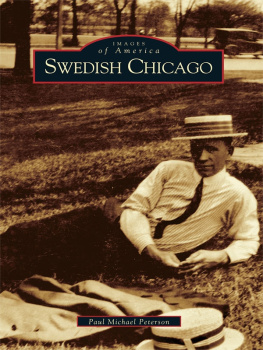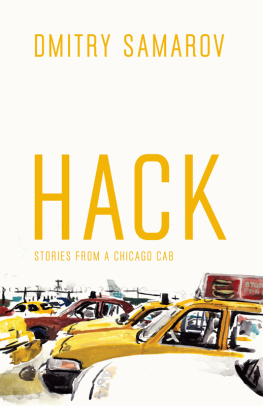Studs Terkels
Chicago
OTHER BOOKS BY STUDS TERKEL
American Dreams
Lost and Found
And They All Sang
Adventures of an Eclectic Disc Jockey
Coming of Age
Growing Up in the Twentieth Century
Division Street
America
Giants of Jazz
The Good War
An Oral History of World War II
Hard Times
An Oral History of the Great Depression
Hope Dies Last
Keeping the Faith in Troubled Times
P.S.
Further Thoughts from a Lifetime of Listening
Race
How Blacks and Whites Think and Feel About the American Obsession
The Spectator
Talk About Movies and Plays with the People Who Make Them
Studs Terkel Interviews
Film and Theater
The Studs Terkel Reader
My American Century
Talking to Myself
A Memoir of My Times
Touch and Go
A Memoir
Will the Circle Be Unbroken?
Reflections on Death, Rebirth, and Hunger for a Faith
Working
People Talk About What They Do All Day and How They Feel About What They Do
1985, 1986 by Studs Terkel
All rights reserved.
No part of this book may be reproduced, in any form,
without written permission from the publisher.
Requests for permission to reproduce selections from this book should be mailed to:
Permissions Department, The New Press, 120 Wall Street, 31st floor, New York, NY 10005.
First published in the United States by Pantheon Books, New York, 1985
This edition published in the United States by The New Press, New York, 2012
Distributed by Two Rivers Distribution
CIP data is available
ISBN 978-1-59558-718-3 (hc)
The New Press publishes books that promote and enrich public discussion and understanding of the issues vital to our democracy and to a more equitable world. These books are made possible by the enthusiasm of our readers; the support of a committed group of donors, large and small; the collaboration of our many partners in the independent media and the not-for-profit sector; booksellers, who often hand-sell New Press books; librarians; and above all by our authors.
www.thenewpress.com
Composition by dix!
This book was set in Centaur MT
2 4 6 8 10 9 7 5 3 1
Studs Terkels
Chicago
Away up in the northward,
Right on the borderline,
A great commercial city,
Chicago, you will find.
Her men are all like Abelard,
Her women like Hloise (as in noise)
All honest, virtuous people,
For they live in Elanoy.
So move your family westward,
Bring all your girls and boys,
And rise to wealth and honor
In the state of Elanoy.
A nineteenth-century folk song
WHEN ABE LINCOLN came out of the wilderness and loped off with the Republican nomination on that memorable May day, 1860, the Wigwam had been resonant with whispers. Behind cupped hands, lips imperceptibly moved: We just give Si Cameron Treasury, they give us Pennsylvania, Abes got it wrapped up. OK witchu? A wink. A nod. Done. It was a classic deal, Chicago style.
As ten thousand spectators roared on cue, Seward didnt know what hit him. His delegates had badges but no seats. Who you? Dis seats mine. Possessions nine-tents a da law, aint it?
Proud Seward, the overwhelming favorite, was a New Yorker who had assumed that civilization ended west of the Hudson. He knew nothing of the young citys spirit of I Will.
When, in 1920, Warren Gamaliel Harding was similarly touched by Destiny, there had been no such whisperings in the Coliseum. Just desultory summer mumblings (it was an unseasonably hot June: 100 degrees outside, 110 inside; bamboo fans of little use): Lowden, Wood, Johnson. Wood, Johnson, Lowden. Johnson, Lowden, Wood. Three front-runners and not a one catching fire. How long can this go on? Four ballots are enough. Cmon, its too hot for a deadlock. Shall we pick straws?
But this wasnt just any convention city. This was Chicago. Never mind the oratory. Yeah, yeah, we know about the Coliseum where, in 1896, the cry was Bryan, Bryan, Bryan as the Boy Orator thundered eloquently of crowns of thorns and crosses of gold. Nah, nah, lets settle this Chicago style.
A hotel room not far away.
The Blackstone, so often graced by Caruso and Galli-Curci during our citys lush opera season, was on this occasion beyond grace. Nah, nah, its too hot. Maybe the Ohio Gang ran things that day, but with H. Upmanns blowing curlicues heavenward in the smokefilled room, the dealHarding, OK?was strictly My Kind of Town, Chicago Is.
Yet, along came Jane Addams. Was it in 1889 that she founded Hull-House? The lady was out of her depth, they said. Imagine. Trying to change a neighborhood of immigrants, scared and lost, where every other joint was a saloon and every street a cesspool. And there was John Powers, alderman of the Nineteenth Ward, running the turf in the fashion of his First Ward colleagues, Bathhouse John and Hinky Dink. Johnny Da Pow, the Italian immigrants called him. He was the Pooh-Bah, the high monkey-monk, the ultimate clout. Everything had to be cleared through Da Pow. Still, this lady with the curved spine, but a spine nonetheless, stuck it out. And something happened.
She told young Jessie Binford: Everything grows from the bottom up. This place belongs to everybody, not just Johnny Da Pow. And downtown. No, she told Jessie, I have no blueprint. We learn life from life itself.
So many years later, years of small triumphs and large losses, Jessie Binford, ninety, is seated in a small Blackstone Hotel room. The Blackstone again, for Gods sake? It isnt a smoke-filled room this time. My cigar, still wrapped in cellophane, is deep in my pocket. Its an H. Upmannwould you believe it? The old woman, looking not unlike Whistlers Mother, is weary and in despair. The wrecking ball had just yesterday done away with Hull-House and most of the neighborhood, as well as the beloved elm beneath her window.
The boys downtown tried to buy off Jessie Binford. You can live at the Blackstone as our guest for the rest of your life, they told her. Anything to keep her quiet. She and a young neighborhood housewife, Florence Scala, were making a big deal out of this. Sshhh. But they wouldnt shush, these two.
These two.
Florence Scala, first-generation Italian-American. Her father, a tailor, was a romantic from Tuscany. He was a lover of opera, of course, especially Caruso records, even the scratchy ones. He had astronomy fever, too, though his longing to visit the Grand Canyon transcended his yen to visit the moon. He was to make neither voyage. The neighborhood was his world and that was enough.









